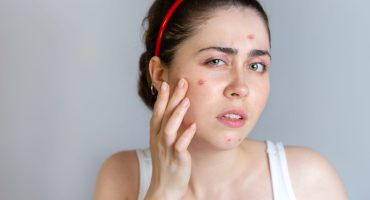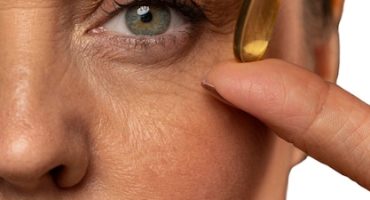

Early Stage of Eczema
Early stages of eczema could be healed with the right medical cream and medicines.


Curing Early Stages of Eczema
Early Stages of Eczema Could be cured by the right medical cream and medicines


Hand Eczema Treatment
Gently apply soothing cream to ease eczema discomfort.


STABILITY
female doctor diagnosing melanoma body female patient suffering from eczema
There are several different types of eczema including:
Atopic dermatitis
Atopic dermatitis, commonly known as eczema, is a chronic inflammatory skin condition characterized by itching, redness, and the development of dry, scaly patches on the skin. Treatment options for atopic dermatitis can vary depending on the severity of the condition, individual factors such as age and overall health, as well as personal preferences. Here are some common treatment options:
- Topical corticosteroids
- Topical calcineurin inhibitors
- Emollients and moisturizers
- Topical phosphodiesterase-4 (PDE4) inhibitors
- Antihistamines
- Wet dressings
- Phototherapy (light therapy)
- Systemic medications
- Avoidance of triggers
Nummular eczema
Nummular eczema, also known as discoid eczema or nummular dermatitis, is characterized by round or oval-shaped patches of inflamed, itchy skin. Treatment options for nummular eczema aim to relieve symptoms, reduce inflammation, and prevent flare-ups. Here are some common approaches:
- Topical Corticosteroids
- Topical Calcineurin Inhibitors
- Topical Moisturizers
- Wet Compresses
- Avoiding Triggers
- Oral Antihistamines
- Phototherapy (Light Therapy)
- Oral Medications
- Skin Barrier Repair Creams
Stasis dermatitis
Stasis dermatitis, also known as venous eczema or gravitational dermatitis, is a skin condition that occurs due to poor circulation in the legs, leading to swelling, redness, and inflammation. It commonly affects individuals with venous insufficiency or varicose veins. Treatment options for stasis dermatitis aim to improve circulation, reduce inflammation, and manage symptoms. Here are some common approaches:
- Compression Therapy
- Elevation
- Topical Treatments
- Emollients and Moisturizers
- Wound Care
- Dietary Changes
- Exercise
- Vein Treatments
Contact dermatitis
Contact dermatitis occurs when the skin comes into contact with a substance that causes irritation or an allergic reaction. Treatment for contact dermatitis aims to relieve symptoms, reduce inflammation, and identify and avoid the triggering substance. Here are some common treatment options:
- Avoidance of Irritants or Allergens
- Topical Corticosteroids
- Topical Calcineurin Inhibitors
- Topical Antihistamines
- Cool Compresses
- Moisturizers
- Oral Antihistamines
- Barrier Creams
- Oral Corticosteroids
Dyshidrotic eczema
Dyshidrotic eczema, also known as dyshidrosis or pompholyx, is a type of eczema characterized by small, itchy blisters that typically develop on the hands and feet. Treatment options for dyshidrotic eczema aim to reduce itching, inflammation, and the formation of blisters while preventing flare-ups. Here are some common approaches:
- Topical Corticosteroids
- Topical Calcineurin Inhibitors
- Topical Moisturizers
- Topical Anti-itch Creams
- Wet Compresses
- Avoiding Scratching
- Oral Antihistamines
- Phototherapy (Light Therapy)
- Oral Medications
Seborrheic dermatitis
Seborrheic dermatitis is a common skin condition characterized by red, itchy, and flaky patches, typically occurring on areas of the body with a high concentration of oil glands, such as the scalp, face (especially around the nose and eyebrows), ears, and upper chest. Treatment options for seborrheic dermatitis aim to reduce inflammation, control itching, and manage symptoms. Here are some common approaches:
- Topical Antifungal Agents
- Topical Corticosteroids
- Topical Calcineurin Inhibitors
- Antifungal Shampoos
- Tar-based Shampoos
- Salicylic Acid Preparations
- Moisturizers
- Avoiding Triggers
- Oral Medications
Patients OPINIONS & REVIEWS
Our Happy Patients
Was able to make an appointment within 2 days! I was in and out in 15 minutes for mole removal and sample for biopsy. I felt welcome and taken care of. Truly amazing.
Shana R.
Very helpful, Professional and knowledgeable. Easy scheduling and will work with you on availability that works for you. Highly recommend seeing her for your dermatology needs.
walter akins
Nurse
DANIELLE LECLAIR, NP
Danielle LeClair, NP graduated from Boston University with a Bachelor of Arts degree in Biology. Her passion in nursing began while working in skilled nursing facilities very early in her nursing career. Soon thereafter she received her Master of Science in Nursing from the MGH Institute of Health Professions in Boston, Massachusetts. Danielle’s professional interests in treating dermatologic conditions was inspired by a preceptorship in dermatology while attending nursing school.
- Atopic dermatitis
- Contact dermatitis
- Dyshidrotic eczema
- Nummular eczema
- Stasis dermatitis
- Seborrheic dermatitis
Atopic dermatitis
Atopic dermatitis is the most commonly known type of eczema and often is the result of an overactive immune system, causing the skin barrier to become impaired. Atopic dermatitis is a chronic inflammatory skin condition with periods of flares and remissions of dry, itchy, scaly skin. It has been thought to arise in childhood and adolescence, but more recent research suggests that atopic dermatitis sometimes starts in adulthood. While it tends to run in families, it is not contagious. Those diagnosed with atopic dermatitis often have other immune hypersensitivity disorders such as asthma and allergies.
Contact dermatitis
There are two types of contact dermatitis; allergic contact dermatitis and irritant contact dermatitis. Allergic contact dermatitis often presents as a red scaly rash in the area of contact with a substance your body doesn’t like. Common allergens include nickel, neomycin, ingredients in cosmetic products, fragrances, and preservatives. Dermatologists often conduct allergy testing for common contact allergens. Once these allergens are identified and the offending substance is removed, the rash subsides. Irritant contact dermatitis presents as a rash when a substance irritates your skin. Common irritants include: hair dyes, nail polish remover, paints, harsh soaps and detergents, just to name a few. Again, once the offending agent is identified and removed, the rash should subside. Sometimes medications such as topical or oral steroids are necessary.
Dyshidrotic eczema
Dyshidrotic eczema is a form of eczema that causes itchy and painful small fluid-filled blisters on the palms of the hands and fingers and sometimes on the soles of the feet. The blisters usually persist for about 3-4 weeks and then progress to scaly rash. The blisters can recur every few months or so. Topical steroids and emollient creams are often prescribed for dyshidrotic eczema.
Nummular eczema
Nummular eczema, sometimes referred to at discoid eczema, is a chronic, inflammatory skin disease characterized by red scaly coin-shaped lesions on your skin, usually on the arms and legs but can occur on your back and chest. Good skin care is essential for nummular eczema (for all types of eczema, actually). Bathing in lukewarm water (not hot water), moisturizing immediately after your bath or shower, and using a humidifier and dry climates will help ease the discomfort associated with eczema.
Stasis dermatitis
Stasis dermatitis occurs in people with poor blood flow, most commonly in the lower legs and ankles. Symptoms of stasis dermatitis include leg swelling, crusting or cracking skin, leg ulcers, and skin discoloration (often turning brown) in the lower extremities. Wearing compression stockings, elevating your legs, and good skin care help manage stasis dermatitis.
Seborrheic dermatitis
Seborrheic dermatitis, more commonly known as dandruff, is characterized by red flaky skin on the scalp, ears, face, and chest. Symptoms of seborrheic dermatitis often worsen in times of stress or in cold dry weather. Several over-the-counter treatments exist, including dandruff shampoo, but many prescription medications can be used to treat this condition.
Medical Dermatalogist Treatment Available at Clear Skin For You
Medical dermatologist treatment options for eczema include topical corticosteroids, moisturizers, antihistamines, and phototherapy.
If you believe you are suffering from eczema and are looking for a solution, Danielle LeClair, NP at Clear Skin For You can help, Schedule an appointment today by calling 410-870-8225..
Discover relief from eczema with our comprehensive treatment options. From soothing topical creams to personalized skincare regimens, our dermatologists provide tailored solutions for managing symptoms and restoring skin health. Say goodbye to discomfort and hello to smooth, healthy skin with our expert care
LATEST STORIES
VIEW ALL -- 02 November 2025 by Danielle, in acne
Accutane Acne Treatment: What to Expect and How It Clears Your Skin
Accutane, also known as isotretinoin, is one of the most effective treatments fo...READ MORE + - 11 February 2025 by Danielle, in Dermatology,hair care
Biotin for Hair Growth – Benefits and Hidden Side Effects in Females: A Dermatologist’s Perspective
Introduction to Biotin and Its Role in Hair Growth Biotin, also known as vitamin...READ MORE + - 11 January 2025 by Danielle, in Dermatology
effects of vitamin D deficiency on skin
Vitamin D is an essential nutrient that plays a critical role in maintaining the...READ MORE +
Manage eczema effectively with three key treatments: topical corticosteroids, moisturizers like CeraVe and Aveeno, and phototherapy. These options target inflammation, hydrate the skin, and alleviate symptoms, offering relief and promoting skin health.
Eczema Treatment


Topical Corticosteroids
These are often prescribed to reduce inflammation and itching. They come in varying strengths and forms (creams, ointments, lotions) depending on the severity of the eczema.


Moisturizers
Regular use of moisturizers helps to keep the skin hydrated, which can prevent flare-ups and soothe existing irritation. Dermatologists may recommend specific moisturizers that are fragrance-free and hypoallergenic.


Topical Calcineurin Inhibitors
These medications are applied to the skin and help to reduce inflammation and itching. They are often used for sensitive areas like the face and neck.


Antihistamines
Oral antihistamines may be prescribed to help relieve itching, especially if it's disrupting sleep.
Top 3 Eczema Treatments
The best top 3 eczema treatments often depend on individual preferences, severity of symptoms, and response to treatment. However, three widely recommended options are:
OUR Eczema SERVICES
Moisturizers
Moisturizers play a crucial role in managing eczema by hydrating the skin and restoring its natural barrier function. Here are some details about moisturizers suitable for eczema:
- Ointments
- Creams
- Lotions
- Gels
Antihistamines
Antihistamines are medications commonly used to relieve itching associated with eczema. Here are some details about antihistamines for eczema:
- First-generation antihistamines
- Second-generation antihistamines
- Relief from Itching
- Additional Benefits
- Side Effects
- Cetirizine (Zyrtec)
- Loratadine (Claritin)
- Fexofenadine (Allegra)
- Diphenhydramine (Benadryl)
- Hydroxyzine (Atarax)
Phototherapy
Phototherapy, also known as light therapy, is a treatment option for eczema that involves exposing the skin to ultraviolet (UV) light under controlled conditions. Here are some details about phototherapy for eczema:
- Narrowband UVB (NB-UVB)
- Broadband UVB
- Excimer Laser
- Mechanism of Action
- Treatment Process
- Duration of Treatment
- Side Effects
- Precautions
CLIENT OPINIONS & REVIEWS
Our Happy Patients
Dynamically restore enterprise value vis-a-vis robust resources. Globally monetize multimedia based leadership skills vis-a-vis client-focused customer service. Objectively synthesize e-business deliverables.
Andrew Kline, CTO
Dynamically restore enterprise value vis-a-vis robust resources. Globally monetize multimedia based leadership skills vis-a-vis client-focused customer service. Objectively synthesize e-business deliverables.
Sammy Jones, Designer
WHO
DANIELLE LECLAIR, NP
We deliver the highest standard of quality and comprehensive dermatology service focused on adolescent, adult, and elder patients. We pride ourselves in providing:
- Personalized, quality one on one care
- Approachable dermatology services in a supportive, judgement-free environment
- Dermatology trained and fully licensed healthcare professional
Top 3 Eczema treatment options
The best top 3 eczema treatments often depend on individual preferences, severity of symptoms, and response to treatment. However, three widely recommended options are:
Topical Corticosteroids: These medications effectively reduce inflammation and itching associated with eczema flare-ups.
Moisturizers with Ceramides and Humectants: Moisturizers like CeraVe, Aveeno Eczema Therapy, and Eucerin Eczema Relief Cream are popular choices. They help hydrate the skin and repair the skin barrier
Phototherapy (Light Therapy): Phototherapy involves exposure to UV light under controlled conditions.
Support is given through a well organized forum

doloremque laudantium, totam rem aperiam, eaque ipsa quae ab illo inventore veritatis et quasi architecto beatae vitae dicta sunt explicabo.
Nemo enim ipsam voluptatem quia voluptas sit aspernatur aut odit aut fugit, sed quia consequuntur magni dolores eos qui ratione voluptatem sequi nesciunt. Neque porro quisquam est, qui dolorem ipsum quia dolor sit amet, consectetur, adipisci velit, sed quia non numquam eius modi tempora incidunt ut labore et dolore magnam aliquam quaerat voluptatem.
Ut enim ad minima veniam, quis nostrum exercitationem ullam corporis suscipit laboriosam, nisi ut aliquid ex ea commodi consequatur? Quis autem vel eum iure reprehenderit qui in ea voluptate velit esse quam nihil molestiae consequatur, vel illum qui dolorem.
Pane 2 content
Phasellus eget justo lacus. Vivamus pharetra ullamcorper massa, nec ultricies metus gravida egestas. Duis congue viverra arcu, ac aliquet turpis rutrum a. Donec semper vestibulum dapibus. Integer et sollicitudin metus. Vivamus at nisi turpis.
Pane 3 content
Donec semper vestibulum dapibus. Integer et sollicitudin metus. Vivamus at nisi turpis. Phasellus vel tellus id felis cursus hendrerit. Suspendisse et arcu felis, ac gravida turpis. Suspendisse potenti. Ut porta rhoncus ligula, sed fringilla felis feugiat eget. In non purus quis elit iaculis tincidunt. Donec at ultrices est.
Pane 4 content
Phasellus eget justo lacus. Vivamus pharetra ullamcorper massa, nec ultricies metus gravida egestas. Duis congue viverra arcu, ac aliquet turpis rutrum a. Donec semper vestibulum dapibus. Integer et sollicitudin metus. Vivamus at nisi turpis.
Pane 5 content
Donec semper vestibulum dapibus. Integer et sollicitudin metus. Vivamus at nisi turpis. Phasellus vel tellus id felis cursus hendrerit. Suspendisse et arcu felis, ac gravida turpis. Suspendisse potenti. Ut porta rhoncus ligula, sed fringilla felis feugiat eget. In non purus quis elit iaculis tincidunt. Donec at ultrices est.
Some examples of moisturizers suitable for eczema include:
Register Online For Appointment
Provide a brief description of your skin concerns or the reason for your visit to help us better understand your needs.
Complete the registration process by confirming your appointment details and submitting the form.
Registering Online will not take a minute or two, you can do so by clicking here
Call for Assistance with Eczema Condition
Dial our toll-free number: Call 410-870-8225 to connect with our clinic and speak directly with one of our knowledgeable staff members.
Briefly describe your symptoms: When prompted, provide a brief description of your symptoms and concerns related to eczema.
Dermatologist Recommended: Cetaphil is a dermatologist-recommended brand known for its gentle and effective skincare products, Cetaphil Restoraderm Eczema Calming Body Moisturizer is, formulated with input from dermatologists to ensure its effectiveness and safety for individuals with eczema-prone skin..
Follow-up and support: Following your consultation, we'll remain available to answer any additional questions you may have and provide ongoing support as needed. Our goal is to ensure that you feel informed, empowered, and confident in managing your eczema condition.
LATEST STORIES
VIEW ALL -- 02 November 2025 by Danielle, in acne
Accutane Acne Treatment: What to Expect and How It Clears Your Skin
Accutane, also known as isotretinoin, is one of the most effective treatments fo...READ MORE + - 11 February 2025 by Danielle, in Dermatology,hair care
Biotin for Hair Growth – Benefits and Hidden Side Effects in Females: A Dermatologist’s Perspective
Introduction to Biotin and Its Role in Hair Growth Biotin, also known as vitamin...READ MORE + - 11 January 2025 by Danielle, in Dermatology
effects of vitamin D deficiency on skin
Vitamin D is an essential nutrient that plays a critical role in maintaining the...READ MORE +
Cetaphil Restoraderm Eczema Calming Body Moisturizer offers relief for eczema-prone skin through advanced Filaggrin and ceramide technologies, alongside MVE delivery for lasting hydration. Its gentle, non-irritating formula, clinically proven efficacy, and dermatologist recommendation make it a trusted choice for soothing eczema symptoms.
Clear Skin For You DANIELLE LECLAIR, NP
Danielle LeClair, NP graduated from Boston University with a Bachelor of Arts degree in Biology. Her passion in nursing began while working in skilled nursing facilities very early in her nursing career. Soon thereafter she received her Master of Science in Nursing from the MGH Institute of Health Professions in Boston, Massachusetts. Danielle’s professional interests in treating dermatologic conditions was inspired by a preceptorship in dermatology while attending nursing school.
RECENT NEWS
VIEW ALL
Accutane Acne Treatment: What to Expect and How It Clears Your Skin
November 2, 2025Biotin for Hair Growth – Benefits and Hidden Side Effects in Females: A Dermatologist’s Perspective
February 11, 2025effects of vitamin D deficiency on skin
January 11, 2025Genital Wart Removal Near Me
October 8, 2024Eczema Treatment
October 8, 2024




